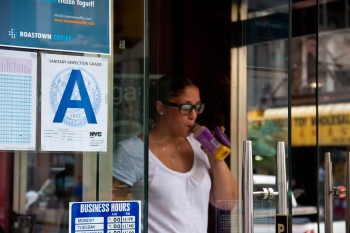Restaurant Letter Grades a Success, Says Mayor
Mayor Michael Bloomberg stood with some Long Island restaurant owners on Monday to laud what he sees as the great success of the restaurant letter-grading system that premiered a year ago.

GRADE A: Roast Town Cafe on West 27th Street and Sixth Avenue is one of the 69 percent of the city's graded restaurants to receive an A. Tara MacIsaac/The Epoch Times
|Updated:






